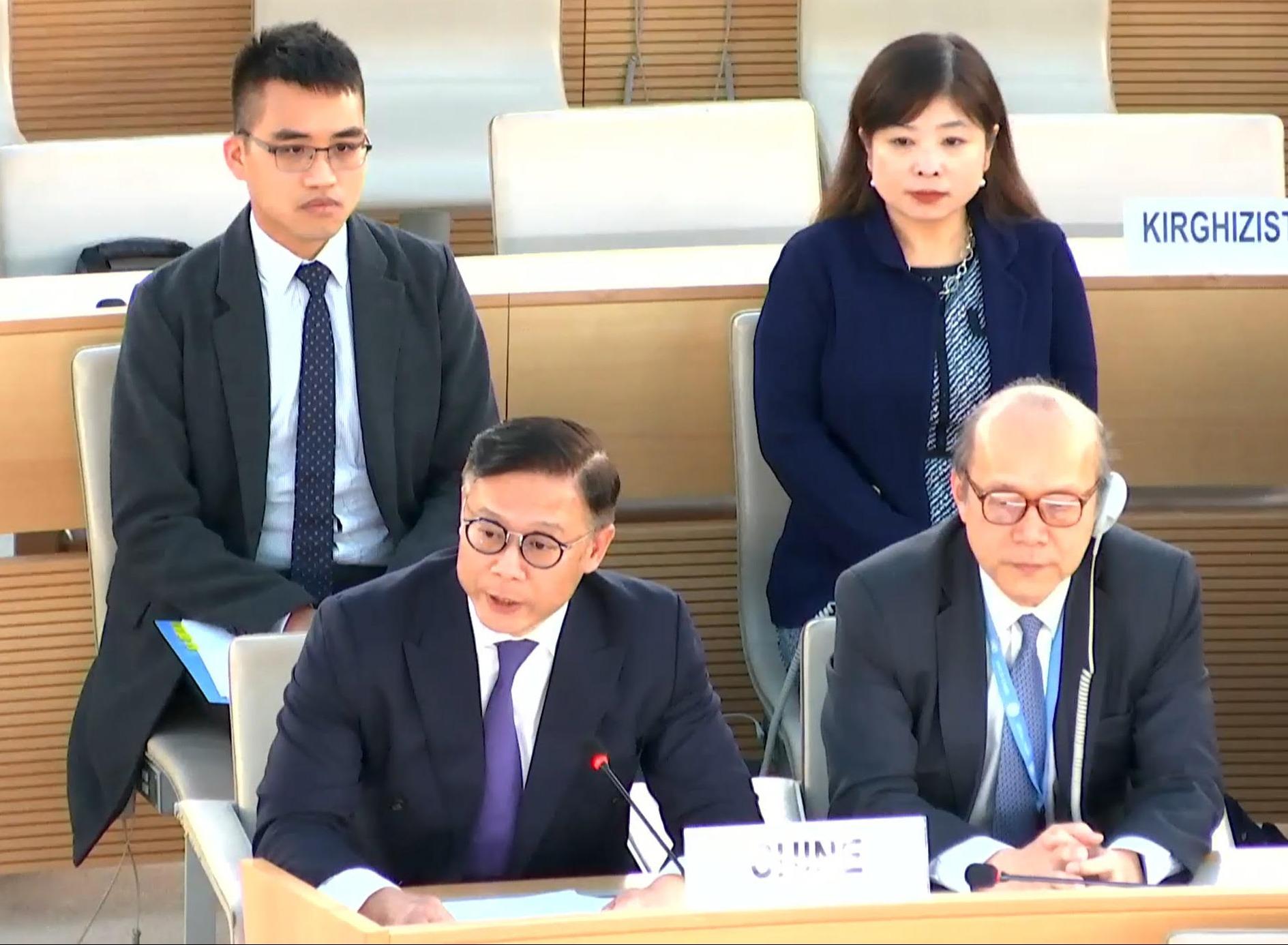 Hong Kong Deputy Secretary for Justice Horace Cheung Kwok-kwan (front row, left), delivers a speech on the Basic Law Article 23 legislation at the 55th regular session of the United Nations Human Rights Council in Geneva, Switzerland, March 20, 2024. (PHOTO / HKSAR GOVT)
Hong Kong Deputy Secretary for Justice Horace Cheung Kwok-kwan (front row, left), delivers a speech on the Basic Law Article 23 legislation at the 55th regular session of the United Nations Human Rights Council in Geneva, Switzerland, March 20, 2024. (PHOTO / HKSAR GOVT)
The just-passed Basic Law Article 23 legislation of Hong Kong will better protect the country from genuine threats to national security in the increasingly intricate geopolitics of our time, Hong Kong’s deputy secretary for justice told the United Nations Human Rights Council in Geneva, Switzerland, on Wednesday.
“The legislation fully aligns with the principles of international laws and practices,” Horace Cheung Kwok-kwan said while delivering a speech on the Safeguarding National Security Ordinance at the 55th regular session of the UNHRC.
READ MORE: Community: New security law paves way for prosperous future
The law was unanimously passed by the Legislative Council – the city’s legislature – on Tuesday with a resounding vote of 89-0, following rigorous scrutiny.
Our new legislation also strictly adheres to the principles of rule of law. The laws are certain and clear, and they come with appropriate exceptions and defenses.
Horace Cheung Kwok-kwan, Deputy Secretary for Justice, HKSAR
Stressing that the new legislation also strictly adheres to the principles of rule of law, Cheung said at the UNHRC meeting that the laws are certain and clear, and they come with appropriate exceptions and defenses.
“There is no question that the general public will inadvertently violate the law,” he said, adding that the legislation was passed to discharge Hong Kong's long overdue constitutional duty to enact laws on its own to safeguard national security.
Pointing out that each and every sovereign state, including China, has an inherent right to enact laws to safeguard its national security, Cheung said that many countries have enacted a host of national security laws based on their own national security risks and needs.
The United States has at least 21 pieces of legislation, the United Kingdom has at least 14 pieces, Canada has at least nine pieces, and Singapore has at least six pieces, he added.
Unfounded criticisms by some countries and organizations, which “are made in complete disregard of basic jurisprudence and facts”, demonstrate nothing more than double standards and sophistry, he said.
ALSO READ: Smearing of SAR new national security law 'destined to fail'
The legislation clearly specifies that the rights and freedoms enshrined in the Basic Law and the provisions of the International Covenant on Civil and Political Rights and the International Covenant on Economic, Social, and Cultural Rights as applied to Hong Kong, will be protected in accordance with the law, said the deputy secretary of justice.
“This important principle forms a cornerstone of the legislation, and is literally written in the new law.”
Cheung, in this connection, told the UNHRC session that the legislative exercise had gained very wide support from the Hong Kong community.
READ MORE: Passage of ordinance — belated but celebrated obligation
Any attempt to discredit or undermine the new law “is misguided at best”, he said, adding: ““We are confident that the legislation will bring about a stable and prosperous future for Hong Kong with the rights and freedoms enjoyed in accordance with the law fully protected, as always.”
Representatives of the Department of Justice, the Security Bureau, and the Constitutional and Mainland Affairs Bureau also joined the meeting. Officials of the special administrative region government attended the meeting as members of China's delegation.


